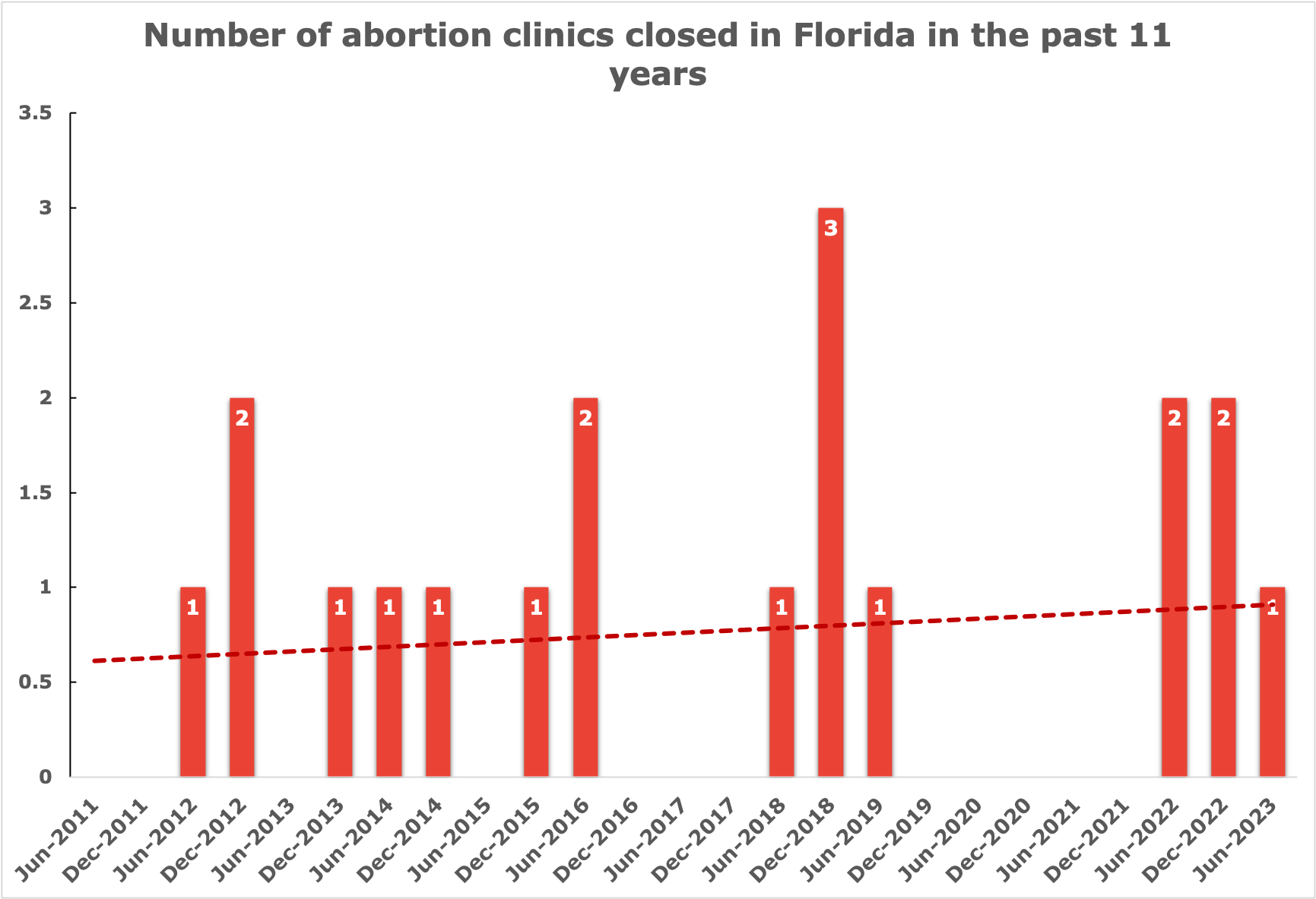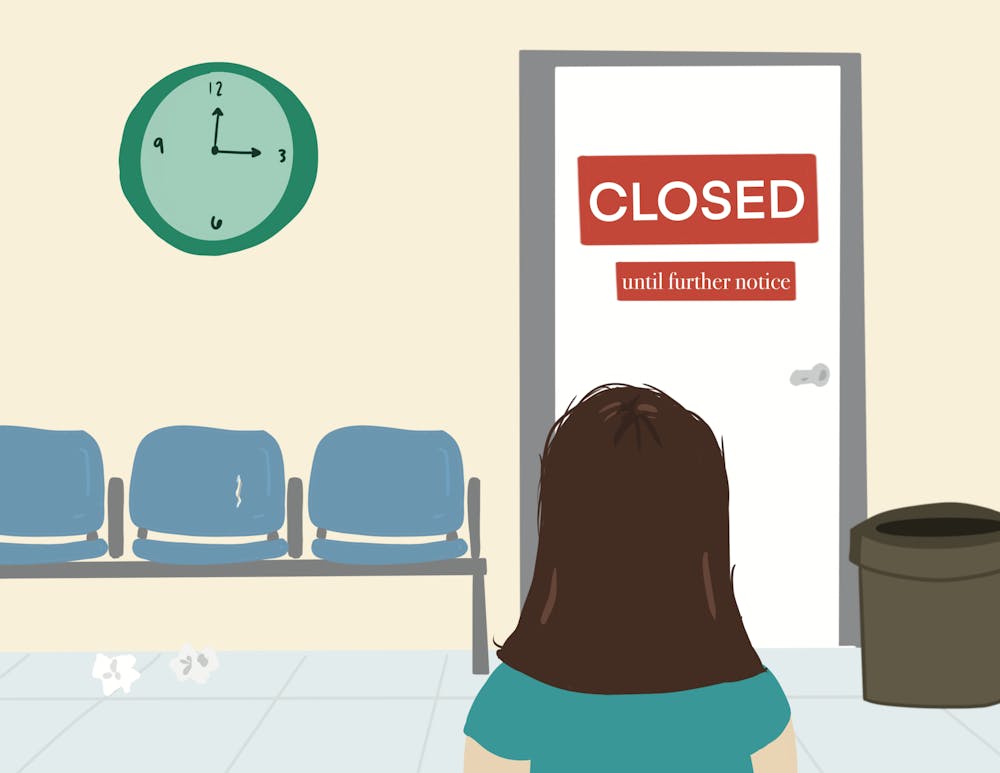Since 2011, 19 licensed abortion clinics have closed in Florida. Three were in the year following the overturn of Roe v. Wade in June 2022.
Increased clinic closures in Florida echo a national trend. At least 61 clinics stopped offering abortion services nationwide in the year after the Roe overturn, mostly in the 14 states that banned abortion outright, according to the New York Times.
As the Florida Supreme Court debates whether to keep Ron Desantis’ 15-week abortion ban on the books, movements like “No More Closed Clinics,” created by Orlando’s Stand With Abortion Now, aim to protect clinics from closure due to increasing legal obstacles.
SWAN coined the phrase in August when the Center of Orlando for Women, Orlando’s only independently owned abortion clinic, faced closure upon receiving a $193,000 fine from the Agency of Healthcare Administration. The order was for violating Florida’s waiting period law that went into effect April 2022, which calls for a 24-hour period between an initial physician visit and abortion procedure.
“Our clinic was left trying to figure out how they were going to close up shop,” said Winnie, 21-year-old SWAN community outreach chair. “They weren't able to handle $200,000 of expenses, especially in a month.”
SWAN, a volunteer-based group of escorts who protect patients from harassment while entering the clinic building, used social media to accumulate donations. It raised over $200,000 in 10 days and started a movement that stretched beyond Orlando, Winnie said.
“We didn’t make it about our clinic,” Winnie said. “We made it about the idea of working-class people coming together to say ‘no’ to closing clinics across the board.”
SWAN hoped the conversation started by its movement would help other clinics, especially those in the American South, keep their doors open. The group’s efforts paid off, Winnie said.
“‘The ‘No More Closed Clinics’ hashtag on TikTok now has already over 8 million views,” Winnie said. “We’ve had a lot of different abortion doctors and abortion escorts from all kinds of clinics … donate and share the information.”

Gainesville abortion clinics
Over 100 miles north of Orlando, Gainesville is feeling reverberations of SWAN’s movement in its own abortion activist community.
Riley Moon, a 22-year-old UF alumna and Planned Parenthood intern, said movements like the one started by SWAN are what get her out of bed in the morning.
The thought of Alachua County’s two abortion clinics — Bread and Roses Well Women Care and All Women’s Health Center of Gainesville — closing is frightening, especially in a college town where assault is one of the most frequent forms of crime, Moon said.
“Imagine being a scared college freshman,” Moon said. “You wake up and you don’t know what happened and you find out later you’re pregnant. What are you going to do? It’s going to be terrifying.”
Laws and ordinances like the 15-week abortion ban and the 6-week ban predicted to follow, not only target abortion clinics, but also all clinics tied to reproductive services, Moon said.
“It’s so difficult for me to understand why people would want to prevent health care altogether,” Moon said. “Like, where am I supposed to go for a pap smear? Where am I supposed to go for just general birth control options?”
Abortion is not banned outright in Florida like in neighboring Alabama. But Gainesville activists worry mounting legislation, like the 24-hour waiting period law, will force abortion clinics to close due to fear of future prosecution and legal fines like the ones faced by Orlando’s clinic, said Jordan Harris, 21-year-old Planned Parenthood volunteer.
“The restrictions are really crazy,” Harris said. “It’s gotten much, much worse in recent years — specifically in the state of Florida.”
All Women’s Health and Bread and Roses, Gainesville’s only two licensed abortion clinics according to ACA, are both for-profit clinics licensed to perform first and second-trimester procedures. All Women’s Health was first licensed in 1992 and Bread and Roses in 2004, and both clinics’ current licenses won’t need renewal until August 2024.
The two clinics have received just four final legal orders each from the ACA since 2008. All Women’s Health’s most recent violation was a $500 fine imposed in 2021 for holding a bottle of expired Clonidine in a medication cabinet. Bread and Roses’ was in March 2016 for not submitting their monthly report of induced terminations of pregnancy for the previous November.
Both clinics were unavailable for comment.
Gainesville’s abortion rights community is taking preemptive strides to protect its clinics. Planned Parenthood’s Gainesville branch, which offers health services but not abortion procedures, is partnering with Floridians Protecting Freedom for the 2024 ballot initiative to put an amendment on the 2024 ballot that would constitutionally protect Floridians’ access to abortion.
“People are really hopeful,” said Laura Goodhue, 50-year-old executive director of the Florida alliance of Planned Parenthood affiliates, “because there’s something that they can do to take power back into their own hands by signing a petition.”
Planned Parenthood Gainesville will continue to give its patients referrals to Bread and Roses, the closest clinic to UF’s campus, and make sure its patients have access to abortion if they need it, Goodhue said.
Gainesville crisis pregnancy centers
Among the fears of Gainesville abortion advocates when considering clinic closure is the potential expansion of crisis pregnancy centers.
Crisis pregnancy centers seek to intercept women with unintended pregnancies who might be considering abortion to persuade them that adoption or parenting is a better option, according to the American Medicine Association.
Community Pregnancy Clinic, located across from UF’s football stadium, offers pregnancy testing, ultrasounds and other assistance for expectant mothers, said Pam Stenzel, 58-year-old client service director.
“We basically want to support women in giving them all of the options that they have available and then give them support to choose life,” Stenzel said.
Community Pregnancy Clinic, a faith-based organization, is supported by religious groups like the Diocese of St Augustine, which includes the clinic in its directory of about 32 pregnancy centers that offer alternatives to abortion, said May Oliver, director of the Human Life and Dignity Office.
“I've been in this for 36 years … so I'm very hopeful, always, that abortion clinics will close,” Oliver said. “Unfortunately, abortion providers do not offer alternatives.”
Crisis pregnancy centers outnumber abortion clinics three to one in the US. In Florida, there are 51 licensed abortion clinics and 151 crisis pregnancy centers — seven of which are in Gainesville, according to the Crisis Pregnancy Center map
Percy Shulla, a 28-year-old Gainesville resident, uses another term for pregnancy crisis centers: “fake clinics.” Shulla volunteered at A Women’s Pregnancy Center in Tallahassee while serving as a missionary for the Baptist Church she grew up in.
“I would take clients back and pretty much just indoctrinate them with a bunch of Christian rhetoric,” Shulla said. “We show them really graphic horrifying videos of abortion procedures — I don’t know how accurate they were — pretty much just to scare expecting people.”
The center offered free pregnancy tests and ultrasounds, but the people running the tests were not medical professionals, Shulla said. The center also calculated for patients when their baby’s heart started beating to persuade them against abortion, she said.
The closure of abortion clinics would allow pregnancy crisis centers like the one where she volunteered to thrive, Shulla said.
“People can get confused and end up in the wrong place because they advertise as though they are real clinics,” Shulla said. “But the people there are just like me — I was 19 and had no training and they just threw me on the floor and I was taking clients back one-on-one.”
Shulla left the clinic after she realized the instructions she was given on what to tell clients were different than what she wanted to say, she said.
“The conversations that I had with the people I was supposed to be indoctrinating [made me] realize they’re just as human as the rest of us,” Shulla said. “I ended up just listening to what they were going through, which was so much more beneficial.”
Harris’ volunteering with Planned Parenthood includes sitting outside centers like Community Pregnancy Clinic to inform patients the center does not offer abortion services. She’s concerned more people will soon begin seeking out “fake clinics” because they will be the only places to offer services at all, Harris said.
While Shulla and Harris believe the closure of abortion clinics would allow CPCs to thrive, Stenzel says the Community Pregnancy Clinic’s operations wouldn’t change.
“We’re going to continue to do what we do and have been doing,” Stenzel said, “and offering all the support that we can for women.”
Abortion clinics will continue to thrive regardless of mounting legal obstacles, Stenzel added.
“If they shut down it’s only because they can’t make enough money,” Stenzel said. “A six-week ban isn’t a total ban … so if you ask me my opinion about whether this law would close abortion clinics, I don’t think it will.”
The Florida Supreme Court heard arguments against the state’s 15-week abortion ban Sept. 8, 2023, but has not yet made a decision. If the ban remains on the books, a six-week ban passed earlier this year would automatically take effect one month after the court decision. Bread and Roses and All Women’s Health of Gainesville are still taking clients in the meantime.
Contact Zoey at zthomas@alligator.org. Follow her on Twitter @zoeythomas39
Zoey Thomas is a media production junior and The Alligator's Spring 2025 data editor. She previously reported for the metro, university and enterprise desks. In her free time, you can find her reading, crocheting or arguing for the superiority of sweet potatoes over regular potatoes.






